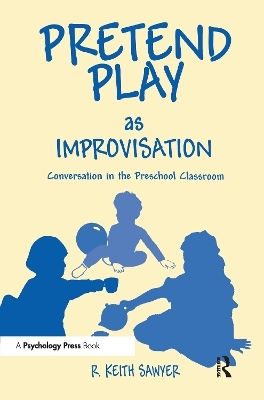
Pretend Play As Improvisation
Conversation in the Preschool Classroom
Seiten
1997
Psychology Press (Verlag)
978-0-8058-2119-2 (ISBN)
Psychology Press (Verlag)
978-0-8058-2119-2 (ISBN)
Examines preschoolers' pretend play in the context of a theory of improvisational performance genres. The text argues that the social skills gained from improvisation are linked to the child's developing ability to improvise with other creative performers.
Everyday conversations including gossip, boasting, flirting, teasing, and informative discussions are highly creative, improvised interactions. Children's play is also an important, often improvisational activity. One of the most improvisational games among 3- to 5-year-old children is social pretend play--also called fantasy play, sociodramatic play, or role play. Children's imaginations have free reign during pretend play. Conversations in these play episodes are far more improvisational than the average adult conversation. Because pretend play occurs in a dramatized, fantasy world, it is less constrained by social and physical reality.
This book adds to our understanding of preschoolers' pretend play by examining it in the context of a theory of improvisational performance genres. This theory, derived from in-depth analyses of the implicit and explicit rules of theatrical improvisation, proves to generalize to pretend play as well. The two genres share several characteristics:
* There is no script; they are created in the moment.
* There are loose outlines of structure which guide the performance.
* They are collective; no one person decides what will happen.
Because group improvisational genres are collective and unscripted, improvisational creativity is a collective social process.
The pretend play literature states that this improvisational behavior is most prevalent during the same years that many other social and cognitive skills are developing. Children between the ages of 3 and 5 begin to develop representations of their own and others' mental states as well as learn to represent and construct narratives. Freudian psychologists and other personality theorists have identified these years as critical in the development of the personality. The author believes that if we can demonstrate that children's improvisational abilities develop during these years--and that their fantasy improvisations become more complex and creative--it might suggest that these social skills are linked to the child's developing ability to improvise with other creative performers.
Everyday conversations including gossip, boasting, flirting, teasing, and informative discussions are highly creative, improvised interactions. Children's play is also an important, often improvisational activity. One of the most improvisational games among 3- to 5-year-old children is social pretend play--also called fantasy play, sociodramatic play, or role play. Children's imaginations have free reign during pretend play. Conversations in these play episodes are far more improvisational than the average adult conversation. Because pretend play occurs in a dramatized, fantasy world, it is less constrained by social and physical reality.
This book adds to our understanding of preschoolers' pretend play by examining it in the context of a theory of improvisational performance genres. This theory, derived from in-depth analyses of the implicit and explicit rules of theatrical improvisation, proves to generalize to pretend play as well. The two genres share several characteristics:
* There is no script; they are created in the moment.
* There are loose outlines of structure which guide the performance.
* They are collective; no one person decides what will happen.
Because group improvisational genres are collective and unscripted, improvisational creativity is a collective social process.
The pretend play literature states that this improvisational behavior is most prevalent during the same years that many other social and cognitive skills are developing. Children between the ages of 3 and 5 begin to develop representations of their own and others' mental states as well as learn to represent and construct narratives. Freudian psychologists and other personality theorists have identified these years as critical in the development of the personality. The author believes that if we can demonstrate that children's improvisational abilities develop during these years--and that their fantasy improvisations become more complex and creative--it might suggest that these social skills are linked to the child's developing ability to improvise with other creative performers.
Sawyer, R. Keith
Contents: W.A. Corsaro, Foreword. Preface. Introduction: Play as Improvisational Performance. Play and Conversation. An Improvisational Theory of Children's Play. Studying Pretend Play in the Preschool Classroom. Performance Style and Performances. Joining the Performance: The Metapragmatics of Play Entry. The Improvisational Exchange: Using Metapragmatic Strategies to Negotiate the Play Frame. The Performance of Play: Children's Group Improvisations. Improvisation and Development.
| Erscheint lt. Verlag | 12.2.1997 |
|---|---|
| Verlagsort | Philadelphia |
| Sprache | englisch |
| Maße | 152 x 229 mm |
| Gewicht | 430 g |
| Themenwelt | Geisteswissenschaften ► Psychologie ► Entwicklungspsychologie |
| Geisteswissenschaften ► Psychologie ► Verhaltenstherapie | |
| ISBN-10 | 0-8058-2119-8 / 0805821198 |
| ISBN-13 | 978-0-8058-2119-2 / 9780805821192 |
| Zustand | Neuware |
| Haben Sie eine Frage zum Produkt? |
Mehr entdecken
aus dem Bereich
aus dem Bereich
Vormals Oerter & Montada
Buch | Hardcover (2018)
Julius Beltz GmbH & Co. KG (Verlag)
64,00 €
Grundlagen, Diagnostik und Therapie vom Säuglingsalter bis zum alten …
Buch | Hardcover (2022)
Klett-Cotta (Verlag)
45,00 €
praktische Hilfen für Kinder und Jugendliche im Autismus-Spektrum
Buch | Softcover (2023)
Kohlhammer (Verlag)
31,00 €


